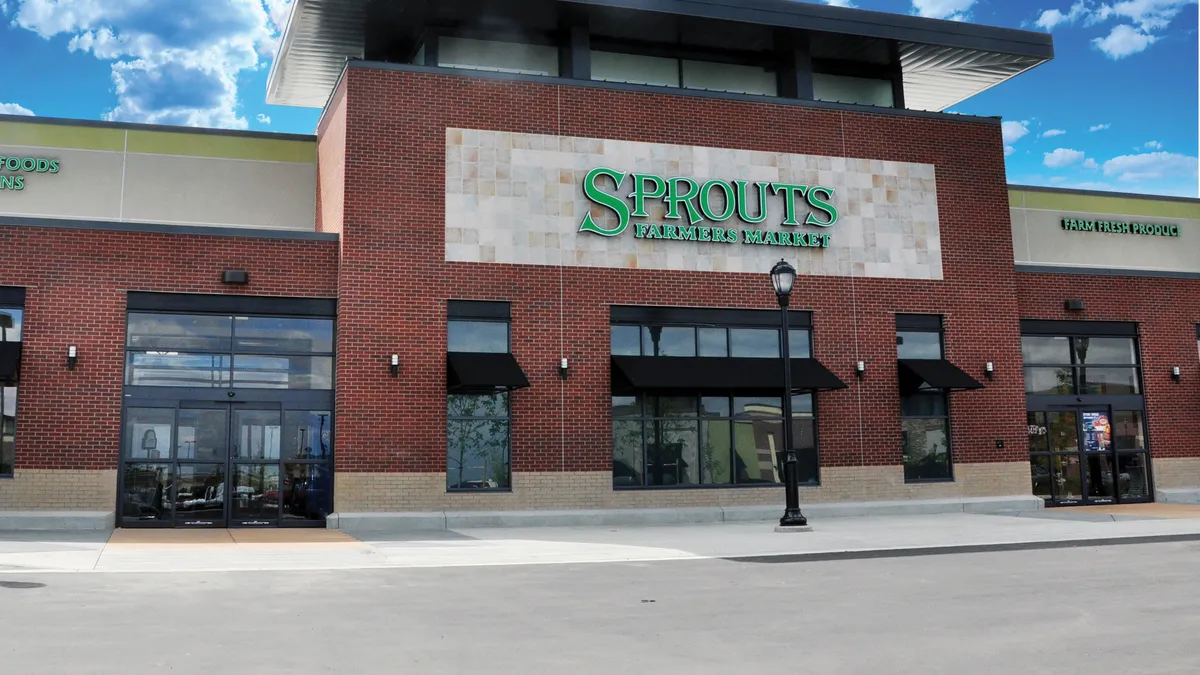Dive Brief:
- Sprouts Farmers Market announced this morning it will offer chain-wide home delivery through Instacart, according to a news release. The natural and organic grocer currently offers delivery in eight cities through Amazon's Prime Now service.
- The partnership will roll out in stages, beginning today with Sprouts stores in Phoenix and Tucson, Arizona, and eventually reaching all major markets where the discount natural and organic grocer operates.
- Sprouts' relationship with Amazon had come under scrutiny from investors following the acquisition of Whole Foods in June. CEO Amin Maredia said at an investors' conference last fall that the company was exploring other e-commerce services. However, in a recent interview with Food Dive, Sprouts CEO Amin Maredia said he was pleased with the Amazon relationship. "We're still with Amazon in eight markets, and that's not going to change in the near future," he said.
Dive Insight:
It's tempting to see this new partnership as a sign that Sprouts is dissatisfied with its Amazon relationship, or looking to dissolve it. What's more likely, though, is that the discount natural and organic grocer wants to add another home delivery option — and one that can reach more markets than Amazon's Prime Now service currently serves.
Speaking at the Goldman Sachs' 24th Annual Global Retailing Conference in September, Maredia told attendees that Sprouts was satisfied with its Amazon partnership, but that it was exploring other services, as well, and was interested in having multiple e-commerce platforms for shoppers to choose from.
"We'll be on multiple platforms over time, because we know customers don't shop at just one spot," he said at the time.
With its retailer-focused model that crowd sources labor from local markets, Instacart can serve Sprouts stores across the country. Amazon, meanwhile, offers its Prime Now ordering and delivery to grocers only in metropolitan markets where it has established the service.
Home delivery is a big deal for Sprouts. It doesn't operate as many locations in a given market as conventional competitors do, making it important to draw customers from a broader radius around stores. In a recent interview with Food Dive, Maredia said delivery is allowing Sprouts to reach shoppers outside of the typical seven-minute drive that most consumers usually make to grocery shop.
"We have a tremendous structural advantage of being able to expand our trade area to customers that are 10, 15, 20 minutes away," he said.
Given these benefits, a broader home delivery rollout is a natural step for Sprouts. The company currently operates 285 stores in 15 states and plans to grow by around 30 locations per year. Company officials have discussed plans to eventually open as many as 1,200 stores across the country. At the Goldman Sachs conference, Maredia said he envisions Sprouts becoming a top industry competitor in online grocery sales.
Despite the retailer's grand ambitions, investors remain skeptical of its ability to compete against Amazon and Whole Foods, particularly as the e-tailer sharpens its pricing focus. Maredia says Sprouts is targeting traditional retailers with its differentiated model, and analysts have grown bullish on the company's prospects, given strong earnings of late.
For Instacart, meanwhile, this relationship marks a strong start to 2018. Last year, the company capitalized on industry-wide anxiety over Amazon's Whole Foods acquisition, expanding from 30 markets to more than 150 as it signed on big names like Albertsons, Wegmans and Publix. This year likely won't see the same explosive growth, but it will be intriguing to see how these existing relationships develop, and how Instacart addresses lingering questions over its labor model, the availability of click and collect, and other areas.









